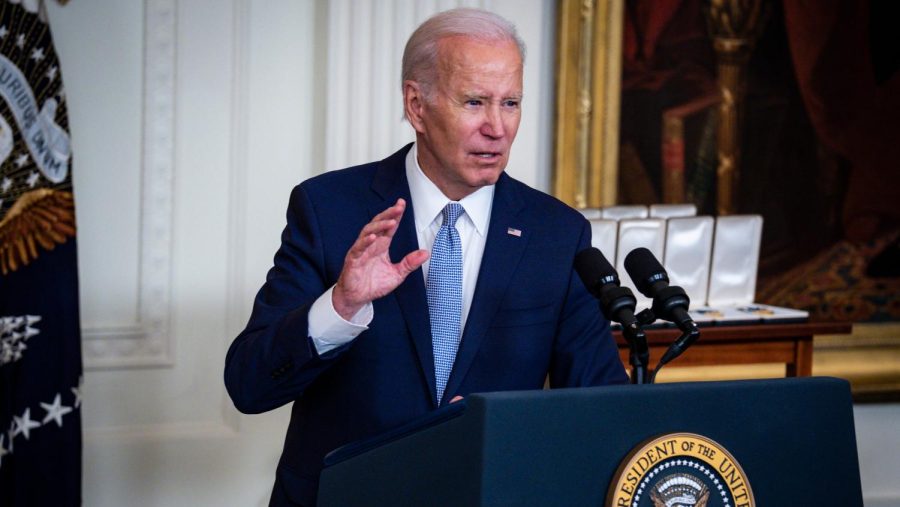Biden’s Classified Document Controversy
Bishop’s students react to news of classified documents found in President Biden’s possession
Following Democrats’ criticism of Trump’s possession of classified documents, classified documents were found at President Biden’s former office and his Wilmington, Delaware, home. This has sparked widespread debate over Democrats’ hypocrisy, how the Department of Justice (DOJ) should handle it, and if President Biden should face punishment.
Nuclear launch codes, CIA assassination attempts, and sensitive military operations; we all have our suspicions of what classified documents shelter. But possibly most intriguing about classified documents is not what they contain, but who possesses them. Recently, our nation has witnessed politicians possess classified documents they shouldn’t have.
President Joe Biden and former President Donald Trump are both facing scrutiny regarding their mishandling of classified documents. In both cases, sensitive government materials were found in places where they shouldn’t have ended up.
By law, presidents and vice presidents must return government documents to the National Archives when they leave office. But on August 8, 2022 the Federal Bureau of Investigation (FBI) searched former President Trump’s house in Palm Beach, Florida, and found classified documents from his presidency. And now, current President Joseph Biden is being investigated after classified documents from his time as Vice President under Former President Barack H. Obama were found in his possession in multiple locations, including his personal home in Wilmington, Delaware.
A current law, the President Records Act, does give guidelines to dealing with this situation. But punishment is only laid out for non-politicians in possession of the files. Due to this, the Department of Justice (DOP) is now trying to figure out how to deal with the situation. And it does depend on the level of classification. Because of this, Trump’s case, and especially Biden’s case, pose a huge legal conundrum.
There are many differences in the case of President Biden, and Mr. Trump. While Biden’s lawyers contacted the Department of Justice (DOP) about his possession upon finding out, and are working cooperatively with the investigation, Mr. Trump’s house had to be raided to find the documents, and he is currently under investigation for obstruction of justice. Also, while Biden had about 20 documents in his possession, Trump had over 700 pages of classified information in his home.
Though Biden’s lawyers cannot disclose the information in the documents, or the degree of classification – that has not stopped students from forming opinions about the differences between Biden and Trump’s cases, what the next steps are, and what this means for the future of America’s trust in politicians.
Eddie Hunter (‘25), an openly liberal student well read in bi-partisain politics, explained, “If he was not the president currently his possession of classified documents would be a problem, but he is, and it is his job to know classified information.” And Eddie’s point is accurate, the classified documents Biden had were not classified to him; they just were not supposed to leave the White House. There is an old saying: don’t take your work home – it is his work to know.
Gerard Blake (‘24), a member of the speech and debate team whose years of experience in political topics have made him well-educated in political affairs, agreed with Eddie that he won’t get punished, saying that “Biden is still President which gives him a little leeway, a little wiggle room.” And Gerard believes this wiggle room will bar him from any punishment such as impeachment.
And this wiggle room was similar for Trump. Although his documents were found after he had left office, he is yet to be charged with any crimes (DOJ is currently investigating him) after almost a year since the incident. Gerard connected this to the Biden case. He said, “People would not care that much about this [Biden’s situation] if the FBI had not raided Trump’s home in Mar-A-Lago before. It is making Biden and the Democrats look like hypocrites and a bit of a mess.”
Nicholas Koura (‘25) explained, “Biden having classified documents is a violation, but in the grand scheme of violations done by past presidents, [Biden’s case] pales in comparison to other unlawful actions.” And this is important to put in perspective. In the scheme of past presidents, having classified information is a low level violation, but it does worsen the trust we have with our political leaders.
Gerard further commented on our current waning trust with Washington. He said that hiding classified documents “doesn’t look like something that would continue to happen repeatedly in a stable democracy.” And that especially now that “Biden has done it, the American people will once again realize that the government is not the most trustworthy source.” Our nation is not new to presidential secrets and scandals poisoning our trust with the government. Andrew Jackson used partisan loyalty, his spoils system, as the only requirement to hold political office; Warren Harding’s presidential decisions were influenced by his mistress blackmailing him; and Richard Nixon had his Republican allies steal classified documents from the Democratic National Committee headquarters (known as The Watergate Scandal).
So more important than the regulations, and the exact misdemeanors the DOJ finds Biden or Trump to be under, is the rhetoric of political distrust and corruption that finds itself more prevalent and threatening than ever as of now.

Ben is a senior and Editor-in-Chief of The Tower. This is his fourth year on staff and second year as an editor, having previously been Graphics Editor....







